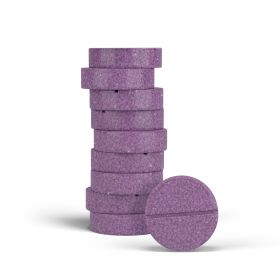Melatonin Capsules
Customer Reviews
There are no reviews yet. Be the first to write a review!
Common Questions
Melatonin Capsules
What is melatonin, and what are melatonin capsules? Let’s start from the beginning — what are capsules?
A capsule is a type of medication taken orally (by mouth). It is a small, cylinder-like container made of gelatin or a different kind of material and contains a solid or liquid dose of medication. Capsules are designed to be easy to swallow and release their contents quickly or slowly in the body, depending on the capsule type and the medicine it contains.
But what about melatonin capsules? Sleep-wake cycles are regulated by melatonin, a hormone produced naturally in the body. Some people take melatonin supplements like capsules to ease insomnia and other sleep disorders and to aid in falling asleep faster. In addition to helping reduce jet lag and adjust to shift work, melatonin capsules are sometimes used to relieve other disorders. What are melatonin capsules, and what are their benefits? Let’s find out!
What Are Melatonin Capsules? Why Should I Try Them?
Melatonin is a natural-made hormone produced in the body and responsible for regulating your circadian rhythm and sleeping cycles. It is primarily created by the pineal gland, which is in the brain. Melatonin levels in the body start to increase in the evening as it gets darker, signaling to the body that it is time to wind down and prepare for sleep.
Melatonin products, such as capsules, help individuals with sleep disorders, jet lag, or other conditions that disrupt standard sleep patterns. These supplements are also sometimes used to treat insomnia and other sleep disorders, such as REM sleep behavior disorder and delayed sleep phase syndrome.
How Are Melatonin Capsules Produced?
Melatonin capsules are produced by extracting melatonin from natural sources, such as the pineal gland of animals or the seeds of plants, or by synthesizing it in a laboratory. The extraction process involves breaking down the tissue containing melatonin and separating the hormone through a series of chemical processes. Synthesizing melatonin in a lab involves creating the hormone using chemical reactions and purifying it to remove any impurities.
Once the melatonin has been extracted or synthesized, it is formulated into a capsule form. This typically involves mixing the melatonin with excipients, inactive ingredients that help stabilize and improve the absorption of the hormone. The melatonin-excipient mixture is then placed into a capsule shell made from various materials, such as gelatins or plant-based polymers. The capsules are then sealed and packaged for distribution.
For a simplified description of how melatonin capsules are produced, see the table below:
|
Step |
Description |
|---|---|
|
1 |
Extract or synthesize melatonin |
|
2 |
Mix melatonin with excipients |
|
3 |
Fill capsule shells with melatonin-excipient mixture |
|
4 |
Seal capsule shells |
|
5 |
Package capsules |
Understanding Melatonin: Melatonin Capsules Explained
Melatonin was first discovered in 1958 by a scientist named Aaron B. Lerner, who isolated the hormone from the pineal glands of cows. In the decades that followed, scientists began to research and investigate the role of melatonin in the body and its potential as a treatment for various conditions.
In the 1990s, melatonin supplements became widely available and began to gain popularity as a natural sleep aid. This was primarily due to the growing interest in alternative and complementary medicine, continued research, and the increasing awareness of the importance of sleep for overall health and well-being.
The Science Behind Melatonin Capsules
The science surrounding melatonin capsules and their potential uses is still being researched and is not fully understood. Some studies have suggested that melatonin may be effective in helping to improve sleep quality and reduce the time it takes to fall asleep in people with insomnia or other sleep disorders. However, more research is needed to understand melatonin supplements' long-term effects and potential risks fully.
Still, research is ongoing. Here are a few studies on melatonin and a summary of their findings:
- A systematic review and meta-analysis published in 2018 examined the effectiveness of melatonin supplements for treating primary insomnia. The study found that melatonin significantly improved sleep onset latency (the amount of time it takes to fall asleep) and sleep efficiency (the percentage of time spent asleep during the night) in people with insomnia.
- A randomized controlled trial published in 2017 investigated the effects of melatonin on sleep quality and cognitive function in older adults with insomnia. The study found that melatonin significantly improved sleep quality and cognitive function in the treatment group compared to the placebo group.
How Can Melatonin Capsules Benefit Me?
There are a few different types of melatonin capsules available on the market, each of which can benefit you differently. They include immediate-release and extended-release formulations. Immediate-release capsules release melatonin into the body as soon as they are ingested, while extended-release capsules release the hormone slowly over a more extended period. The type of melatonin capsule most suitable for an individual will depend on their specific needs and the advice of a healthcare professional.
It is important to note that melatonin is not a replacement for good sleep hygiene and should not be used as a long-term solution for sleep problems. It is also unsuitable for everyone and may interact with certain medications or medical conditions.
Which Type of Melatonin Capsule Should I Take?
It is difficult to estimate the worth of the melatonin supplement industry as a whole, as it is a small part of the more significant dietary supplement industry. According to one report, the global market for melatonin supplements was valued at around $75 million in 2018 and is expected to grow at a compound annual growth rate of 9.7% between 2019 and 2024.
Because the industry is so large, consumers like yourself have options. There are even melatonin gummies. Which type of capsule should you take? Look at the table below:
|
Type |
Benefits |
Drawbacks |
|---|---|---|
|
Immediate-release |
Releases melatonin into the body quickly, which may be helpful for people with sleep disorders or jet lag |
May cause side effects such as dizziness, headache, or nausea |
|
Extended-release |
Releases melatonin slowly over a longer period of time, which may be more suitable for people who have trouble staying asleep |
May be less effective at improving sleep onset latency (the amount of time it takes to fall asleep)
|
Do Melatonin Capsules Have Any Side Effects?
Compared to other forms of melatonin, capsules are relatively easy to take. You pop two with water, swallow, and naturally fall asleep. There are other benefits as well, which may include some of the following:
- Falling asleep faster
- Sleeping for more extended periods
- Enhancing the quality of sleep
- People with insomnia can improve their quality and quantity of sleep
- Increasing the quality and quantity of sleep in older adults
However, you should be cautious because melatonin capsules may have adverse effects if misused, as with all supplements. The following side effects may occur:
- Dizziness
- Headache
- Nausea
- Next-day drowsiness
Should you experience any of the above adverse effects, stop using melatonin immediately and speak with a professional about adjusting your dose.
What’s the Correct Dose of Melatonin Capsules?
Dosing melatonin, especially melatonin capsules, can vary from person to person. The correct dose for an adult will depend on a variety of factors, including some of the following:
- An individual's age
- A person’s weight
- A person’s health and any underlying conditions
- Reason for taking melatonin
- Tolerance to melatonin
- Other medications or substances used
- An individual’s gender
Always follow the dosing instructions on the label or as directed by a healthcare professional.
Generally, adults should take 1 to 3 mg of melatonin 30 minutes to an hour before bedtime as a starting dose. Some people may find that a lower dose is sufficient, while others may require a higher amount to achieve the desired effect. The lowest effective dose should be used first, and the dosage should be gradually increased if necessary. Taking too much melatonin can cause nausea, dizziness, and headaches.
Dosing Melatonin Capsules Based on Need
The amount of melatonin you take is typically based on your reason for taking it. Insomnia is a different issue than jet lag, for example. Look at the chart below to see different dosing guidelines for melatonin capsules.
|
Use |
Recommended Dose |
|---|---|
|
Insomnia |
1-3 mg 30-60 minutes before bedtime |
|
Jet Lag |
0.5-5 mg 30-60 minutes before bedtime, for a maximum of 7-14 days |
|
Delayed sleep phase syndrome |
3-6 mg 30-60 minutes before bedtime |
|
REM sleep behavior disorder |
3-12 mg 30-60 minutes before bedtime |
Melatonin Capsules: Some Final Thoughts
Suppose you’re looking for a good night’s rest. Try some melatonin capsules today! Melatonin is an all-natural way to promote restful sleep, and capsules offer one of the simplest ways to consume melatonin.




